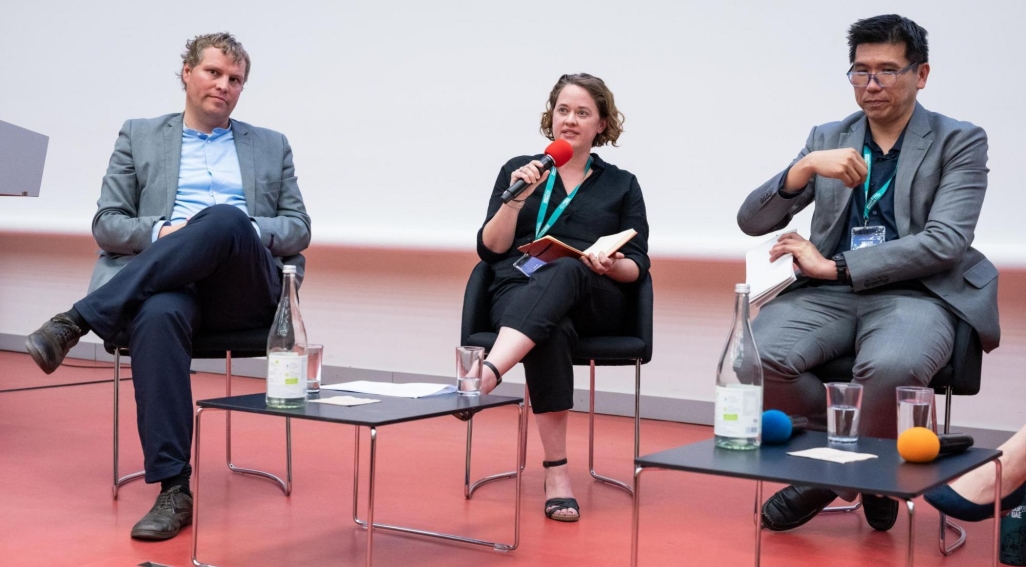The LSHTM Pathfinder Initiative research team and partners presented findings from a workshop on the health co-benefits of climate mitigation at the What Works Climate Solutions Summit, highlighting ways forward for research, policy and action on climate and health.

The What Works Climate Solutions Summit took place from 9 to 12 June in Berlin, bringing together scientists, policymakers, funders and other stakeholders to advance evidence-based climate policy. Health was a key theme at the summit, with speeches and panels highlighting both the health impacts of the climate crisis and the potential health benefits of climate action.
Andy Haines, Co-Chair of the Pathfinder Initiative and Professor of Environmental Change and Public Health at LSHTM, presented findings from the Lancet Pathfinder Commission report on pathways to a healthy net-zero future in a keynote speech, setting the tone for the solutions-oriented focus of the summit. Reiterating key messages from the report, the speech highlighted major opportunities for health from effective climate action across sectors and the need to evaluate the impact of implemented actions on climate and health.
On the second day, the Pathfinder Initiative hosted a session on “Aligning evidence on climate change mitigation and health”, chaired by Hugh Sharma Waddington, Assistant Professor at LSHTM, to present outcomes from a workshop held earlier this year and discuss next steps. Sarah Whitmee, Assistant Professor at LSHTM, opened the event with a summary of key findings and recurring themes. These included: the need for intersectoral evidence and breaking down of disciplinary siloes; the role of funders in supporting changes within the research community; and building relationships between researchers and policymakers to facilitate co-production of research and tailoring of research questions to policy needs. Several research needs were also identified at the workshop, including the need for context-specific and timely evidence, as well as evidence to support investment cases for climate and health interventions.
Following this, Rosie Green, Professor of Environment, Food and Health at LSHTM, recapped findings from the Pathfinder Initiative review of evidence on climate mitigation and health, highlighting challenges in bringing together evidence due to the variety of metrics and methods used in existing reviews, as well as data gaps in low- and middle-income countries and lack of evidence on the climate and health impacts of implemented solutions. The presentation then focused on work currently being carried out by the Pathfinder Initiative research team to develop and refine a checklist for greenhouse gas and health modelling studies to help standardise and facilitate evidence synthesis (reviews of evidence).
Building on the Pathfinder Initiative presentations, David Ameyaw, CEO/President at the International Centre for Evaluation and Development, highlighted the need for improved capacity building, funding and resources to support evidence synthesis in climate and health in low- and middle-income countries; and Rachel Huxley, Head of Mitigation, Climate and Health, at the Wellcome Trust, shared insights on approaches to economic evaluation of the health impacts of climate action.
Many of the key points discussed during the Pathfinder session were representative of broader themes at the summit, highlighting challenges and opportunities for evidence synthesis and translation to policy and action. The Pathfinder Initiative research team also engaged in wider discussions throughout the four days, including panels and roundtables focusing on a range of topics relating to the summit’s overarching theme of understanding “what works” for climate policy.
Reflecting on the summit, Sarah Whitmee said, “The summit provided an opportunity for evidence synthesis researchers, decision makers, funders and other key stakeholders to share insights and learning to accelerate progress towards better informed climate action for health. With upcoming elections and ahead of major climate change assessments such as the IPCC 7th assessment report and special report on cities, there is a crucial need for rigorous, timely, policy-relevant evidence and effective communication to translate this into action.”
Rosie Green said, “There was an urgent need for the global climate community to come together and discuss best practice for generating and synthesising evidence and making sure it can be used by policy makers. The summit was a wonderful experience and really showcased the brilliant work already done, but also the major gaps still to be filled. For the Pathfinder Initiative, it confirmed that much more evidence on the health benefits of implemented climate change mitigation actions is needed, as well as living and user-friendly evidence syntheses.”
Read more: Evidence must guide policy and practice towards health centred and equitable climate solutions - BMJ